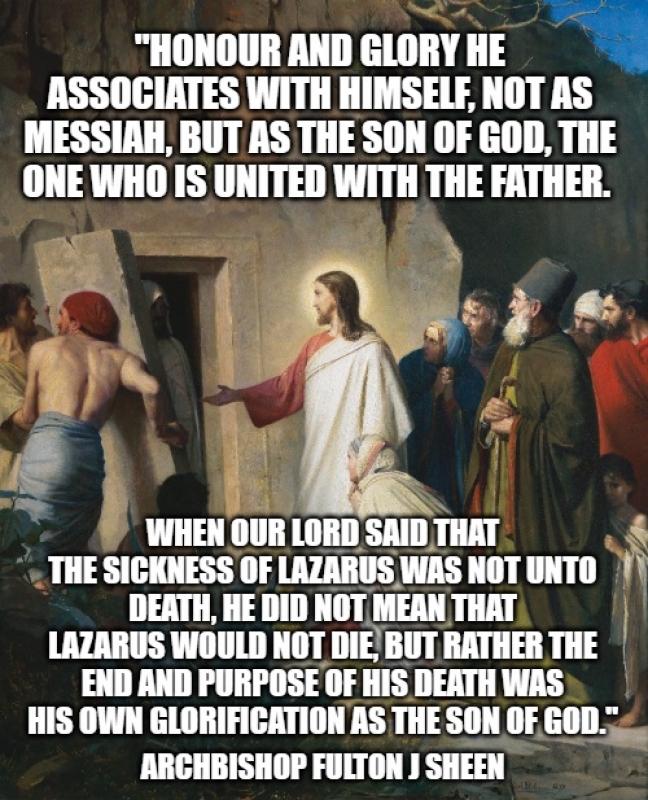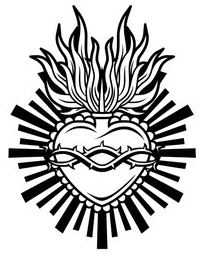5th Sunday of Lent (Year A) - 26 March
26th March 2023

5th Sunday of Lent (Year A) - 26 March
A reflection on today's Gospel by the Venerable Archbishop Fulton J Sheen:
"Many were the attempts on the life of Christ, particularly when He declared Himself to be the Son of God. But His death was formally decided upon when He showed His power over death by the resurrection of Lazarus.
"Previously, He often spoke of His death first, and then His Resurrection. This time He spoke of His Resurrection first as His enemies appointed His death. The empty tomb of Lazarus provoked the decision to give Him a Cross; but He in return would give up the Cross for the empty tomb.
"It was not the first time He had spoken of His Resurrection. Early in His public life, when He fed the multitudes and promised Himself as the Bread of Life, He said that He would give resurrection to others (John 6:38). These words went beyond predictions of His Own Resurrection; they were an affirmation that all who believed in Him and lived by His Risen Life would enjoy resurrection through His power.
"Previously, He had raised at least two others from the dead. One was the daughter of Jairus, the other was the son of the widow of Naim. The first had just died; the second was already in his coffin; but the most astounding of all was Lazarus.
"When Lazarus fell sick, Martha and Mary sent a messenger to Jesus saying: ‘Lord, he whom Thou loves lies here sick.’ The sisters called Him “Lord,” indicating a recognition of His deity and authority. Nor did they put source of the love in Lazarus; rather its source was put in Christ Himself. The sisters appealed to His love, and left it to His decision to do what was best. When Our Lord received the message, He said: ‘The end of this sickness is not death; It is meant for God’s honour, To bring honour to the Son of God.’ There must have been present to His mind at one and the same moment both the death of Lazarus and His own Resurrection; for later on, when He visited Bethany and raised Lazarus from the dead, He said to Martha: ‘Have I not told thee that if thou has faith, Thou will see God glorified?’ Honour and glory He associates with Himself, not as Messiah, but as the Son of God, the One Who is united with the Father. When Our Lord said that the sickness of Lazarus was not unto death, He did not mean that Lazarus would not die, but rather the end and purpose of His death was His own glorification as the Son of God.
"Very likely the sisters felt that as soon as Our Lord received their message, He would hurry to the bedside of Lazarus; but He stayed two days at the place where He was after receiving the news. If the last chapter of the death of Lazarus had not been written, it would have seemed that Our Blessed Lord was lacking in sympathy. It happened that this was one of the rare instances about death and sickness and misfortune where the last chapter was written, and where God’s purposes are seen even in His delay.
"God’s delays are mysterious; sorrow is sometimes prolonged for the same reason for which it is sent. God may abstain for the moment from healing, not because Love does not love, but because Love never stops loving, and a greater good is to come from the woe. Heaven’s clock is different from ours. Human love, impatient of delay, would urge speed. The same delay took place when He was on the way to the house of Jairus, whose daughter He restored to life. Here Our Blessed Lord, instead of speeding along the way, took out some precious moments to heal a woman who was suffering from an issue of blood, as she touched His garments in the crowd. The works of evil are sometimes done in a hurry. Our Lord told Judas to go about his dirty work 'quickly.'
"After two days, Our Lord spoke again about the family He loved. He did not say, ‘Let us go to Lazarus’ or ‘to Bethany,’ but rather ‘Let us go back to Judea’—the capital of which was Jerusalem, where the opposition against Him was centered. When the disciples heard this, immediately realising the threatenings against His life and the stonings in Jerusalem, they said concerning the Pharisees and the leaders of the people: ‘The Jews were but now threatening to stone Thee; Art Thou for Judea again?’ Our Lord was testing them. Just a few weeks before, John recounted of His enemies: ‘Thereupon once again they had a mind to seize Him; But He escaped from their hands.’ He was now suggesting to His Apostles that they go back to the centre of opposition. His Hour was near. The Apostles could not see the prudence or the common sense of such a step. They were fearing for their own safety as well as that of their Master, though they did not mention themselves as being afraid; rather, they spoke only of the enemies that were threatening to stone Him. The answer the Lord gave them was another indication of the Divine disposition of His life, and that no man could take it away from Him (John 11:9-10).
"As was His custom, He was stating a simple truth with a double meaning, one literal, the other spiritual. The literal sense was: There is the natural light of the sun; for about twelve hours man works or makes a journey; during these daylight hours the sun shines on his path. If, however, a man journeys or works at night, he stumbles or else fumbles his work. The spiritual sense was that He had called Himself the Light of the World. As no one can stop the sun from shining during its appointed hours of the day, so no one could ever check or stop Him in His mission. Even though He went up to Judea, no harm could befall Him until He permitted it. As long as His light was shining on the Apostles they would have nothing to fear, even in the city of persecutors. It was the same idea that He had given in answer to Herod when He called him a fox. There would come a time when He would permit the light to be put out and that would be when He would say to Judas and His enemies in the garden, “This is your hour and the power of darkness.” But until He gave permission, His enemies could do nothing. The day exists until the Passion; the Passion is the night. No one could take from Him one single second of the appointed twelve hours of light with which He was to teach; as no one could hasten one second of the hour of darkness when He would go to His death. When He did finally announce that they should start on their journey, melancholic and pessimistic Thomas said to his fellow disciples: ‘Let us go too, and be killed along with Him.’
"Knowing the tremendous opposition there was in Jerusalem, Thomas now suggested that they might all die together in the Holy City. Whatever else may be said of Thomas, it must be admitted that quicker than all the others, he recognised the death that was in store for Our Blessed Lord, though he was the last to recognise the Resurrection. If Our Blessed Lord desired to have Himself killed, Thomas was willing to be killed with Him. Whenever Thomas appears in the Gospel, he is always taking the black side. And yet, if the only way of continuing to be with the Master was to die with Him, Thomas was willing to do that.
"When Our Blessed Lord arrived at Bethany, Lazarus had already been buried for four days. Bethany, being less than two hours away from Jerusalem and within sight of the temple, was the scene of a great concourse of people and particularly of enemies when His arrival was announced. Many comforters had also come to console the poor sisters. When the news came of the arrival of Jesus, Martha, the active one, rose up and went out to meet Him, while Mary remained in the house. Martha had some confidence in the power of Christ, but it was still a very limited one, for she told Him: ‘If Thou had been here, My brother would not have died.’ When Our Lord said that her brother would rise again, Martha acknowledged that he would, in the general resurrection on the last day. The faith that Martha expressed in the resurrection was that of most of the Jews, with the exception of the Sadducees. As the woman at the well knew that the Messiah would come, and yet did not know that He was already talking to her, so Martha, though believing in the resurrection, did not know that the Resurrection was standing before her. As Our Lord told the woman at the well that He was the Messiah, so now He said to Martha: ‘I am the Resurrection and Life.’
"If Christ had said: ‘I am the Resurrection,’ without promising to bestow spiritual and eternal life, there would have been only the promise of reincarnations into successive layers of misery. If He said: ‘I am the Life,’ without saying, ‘I am the Resurrection,’ we would have merely the promise of our continued discontents. But by combining the two, He affirmed that in Him was a life which, by dying, rises to perfection; therefore death was not the end, but the prelude to a resurrection in the newness and fullness of life. It was a new way of combining the Cross and glory, which ran like an antiphon through the Psalm of His life. The moment He said this, He walked deliberately into His enemies in Judea. Our Blessed Lord was reluctant to use the word ‘death,’ which proved that His whole life was set against it. He used the same word about the daughter of Jairus as He did about Lazarus, namely, they were ‘asleep.’ It would be the same word the followers of Christ would use about Stephen, that he ‘fell asleep.’
"When Our Lord asked Martha if she believed that whoever believed in Him would never die, she answered: ‘I have learned to believe that thou art the Christ; Thou art the Son of the living God; It is for Thy coming the world has waited.’ This full faith in the Incarnation prepared for the miracle to follow. Mary comes weeping upon the scene. When Our Lord saw her tears and those of her friends: ‘He sighed deeply and distressed Himself over it.’
"Rather active than passive, He entered into sympathy with death and sorrow, two of the major effects of sin. He hungered because He willed it; He was sorrowful because He willed it; He would die because He willed it. The long procession of mourners through the centuries, the ghastly effect of the death which He Himself was about to take upon Himself, roused Him to sip the cup of the Cross. No worthy High Priest could He be without having compassion on our sorrows. As He was weak in our weakness, poor in our poverty, so He was sorrowful in our sadness. This deliberately willed sharing of the sorrows of those whom He would redeem caused Him to weep. The Greek word that is used implies a calm shedding of tears. Our Blessed Lord is described in the Scriptures as weeping three times; once over a nation, when He wept over Jerusalem; once in the Garden of Gethsemane, when He wept over the sins of the world; and in this instance over Lazarus, when He wept for the effect of sin, which is death. None of these tears were for Himself, but for the human nature which He had assumed. In every instance, His human heart could distinguish the fruit from the root, the evils which affect the world from their cause, which is sin. Truly, He was ‘the Word made Flesh.’
"Many around the grave of Lazarus said: ‘See how He loved him.’ But others who also wept with sorrow showed their fangs as they asked: ‘Could not He, who opened the blind man’s eyes, Have prevented this man’s death?’ There was evidently here a halfhearted belief that He was the Messiah on account of other wonders that He had done. On the Cross too, they would admit every miracle, except the fact that He apparently could not come down from the Cross. Now they were willing to admit every miracle; but certainly if He were the Messiah and the Son of God, He would have prevented Lazarus from dying. Since He did not, therefore, He was not the Christ. Ignoring their taunts, when He came to the tomb where Lazarus was laid, He suggested that the stone be taken away. Martha confirmed the certain death of Lazarus saying to Him: ‘Lord, the air is foul by now; He has been four days dead.’ She was warning Our Lord that the condition of the dead man was such as to abandon all hope of his resurrection until the last day. But when in obedience to Our Lord’s command the stone was taken away, Our Lord addressed Himself to His Heavenly Father in prayer. The burden of His prayer was that through this miracle everyone who saw it might believe that the Father and He were One, and that the Father had sent Him into the world. Then: ‘He cried in a loud voice, Come out, Lazarus, to My side.’
"Lazarus came from the tomb with the graveclothes wrapped about him; the loving hands of his sisters removed the towel that covered his face; and he who had been captive by death was restored to life. Here in the full glare of a noonday sun, in the presence of hostile witnesses, a man who had been dead for four days was restored to life in a moment.
"As the sun shines on mud and hardens it, and shines on wax and softens it, so too this great miracle of Our Blessed Lord hardened some unto unbelief, and softened others unto belief. Some believed: but the general effect was a resolve to put Our Lord to death. Many went off to the Pharisees, and reported all that Christ had done.
"There was no question about the fact of the resurrection; the problem was how to prevent Him from becoming popular in virtue of such power. He had clearly demonstrated by His miracles that He was the Christ. But miracles are no cure for unbelief. Some would not believe even though one were to rise daily from the dead.
"A resurrection sealed His death. Because a stone had been rolled away from a grave and a dead man called back to life, authorities now decreed that a stone should be rolled in front of His grave. ‘From that day forward, then, They plotted His death.’" (Life of Christ)
A Lenten Prayer (St Pope Pius V)
Look with favour, O Lord, on Your household. Grant that, though our flesh be humbled by abstinence from food, our souls, hungering after You, may be resplendent in Your sight. Amen. 🙏💖💐
Food for thought
Christ has told us that the way to Heaven is along the straight path and through the narrow gate. Suffering may be likened to the tug of God’s guiding hand to keep us set upon this thorny way.


